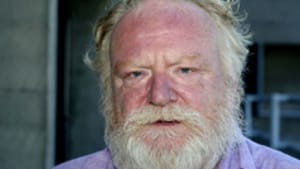Stay in the Loop
BSR publishes on a weekly schedule, with an email newsletter every Wednesday and Thursday morning. There’s no paywall, and subscribing is always free.
The thoughtful Irish
"Carthaginians' by Frank McGuinness

Theatrical events have taken place in cemeteries before, but never has such a setting been so essential to a play. Carthaginians is a 1988 drama about contemporary Irish gathering in a graveyard to talk about death and resurrection as they try to resolve their bitterness after British troops fired on protesting Irish on Bloody Sunday in 1972.
The play, for the most part, is pastoral and quiet— suitable for characters sitting on the grass rather than strutting on a stage.
This production even integrated itself into the surroundings by having some cast members sit among the onlookers so we thought they were one of us until they started speaking.
A belief in resurrection isn't necessary to appreciate the play. Even some of the characters themselves feel that when you're dead, you're gone for keeps. This is Northern Ireland in the 1980s, and monolithic belief in Catholic doctrine is no longer absolute. These people are well read and cognizant of history (such as the Roman war against Carthage) as well as The Flintstones on TV. They also accept homosexuality (although homosexuality wasn't decriminalized in Ireland until 1993).
These characters are, however, steadfast in their contempt for Protestants and the British.
Other writers equate Irish authenticity with primitivism, but McGuinness stresses Irish intellectual interests, such as the historic parallels between Ireland and Carthage: Both were vibrant civilizations subjugated by other powers. McGuinness's Irish also identify with Martin Luther King and the American civil rights movement.
In one scene, the characters join in singing "We Shall Overcome," and one Irish man recites King's "I have a dream" speech while all his friends nod knowingly. But he amends the text, dreaming of a day when all people will join together in peace as long as it's Catholic with Catholic. He wants nothing to do with the damned Protestants.
These higher-toned people are a contrast to the lower-class Irish we see in dramas by that other popular Irish playwright, Martin McDonagh. McGuinness uses far fewer curse words. And McGuinness relies on quiet contemplative moments rather than on shocking action.
This production was performed six times in the graveyard at Gloria Dei Old Swedes' Church, and I saw one of its two performances at Laurel Hill Cemetery. The setting was perfect, as this cemetery rises so high above the banks of the Schuylkill River that it seems otherworldly; you become unaware that a city is so near.
A large cast of New York and Philadelphia-area actors did a convincing job, although the outdoor setting caused one problem. The actors' voices, as they moved around a large area, tended to vanish into the air, and sometimes were obscured by sirens or the sound of airplanes passing overhead. Body mikes and amplification would be a good idea for the future.
*
The play, for the most part, is pastoral and quiet— suitable for characters sitting on the grass rather than strutting on a stage.
This production even integrated itself into the surroundings by having some cast members sit among the onlookers so we thought they were one of us until they started speaking.
A belief in resurrection isn't necessary to appreciate the play. Even some of the characters themselves feel that when you're dead, you're gone for keeps. This is Northern Ireland in the 1980s, and monolithic belief in Catholic doctrine is no longer absolute. These people are well read and cognizant of history (such as the Roman war against Carthage) as well as The Flintstones on TV. They also accept homosexuality (although homosexuality wasn't decriminalized in Ireland until 1993).
These characters are, however, steadfast in their contempt for Protestants and the British.
Other writers equate Irish authenticity with primitivism, but McGuinness stresses Irish intellectual interests, such as the historic parallels between Ireland and Carthage: Both were vibrant civilizations subjugated by other powers. McGuinness's Irish also identify with Martin Luther King and the American civil rights movement.
In one scene, the characters join in singing "We Shall Overcome," and one Irish man recites King's "I have a dream" speech while all his friends nod knowingly. But he amends the text, dreaming of a day when all people will join together in peace as long as it's Catholic with Catholic. He wants nothing to do with the damned Protestants.
These higher-toned people are a contrast to the lower-class Irish we see in dramas by that other popular Irish playwright, Martin McDonagh. McGuinness uses far fewer curse words. And McGuinness relies on quiet contemplative moments rather than on shocking action.
This production was performed six times in the graveyard at Gloria Dei Old Swedes' Church, and I saw one of its two performances at Laurel Hill Cemetery. The setting was perfect, as this cemetery rises so high above the banks of the Schuylkill River that it seems otherworldly; you become unaware that a city is so near.
A large cast of New York and Philadelphia-area actors did a convincing job, although the outdoor setting caused one problem. The actors' voices, as they moved around a large area, tended to vanish into the air, and sometimes were obscured by sirens or the sound of airplanes passing overhead. Body mikes and amplification would be a good idea for the future.
*
What, When, Where
Carthaginians. By Frank McGuinness; directed by Rosey Hay. REV Theatre Company production for Fringe Festival, September 2-17, 2011, at Gloria Dei (Old Swedes’) Church, 916 S. Swanson St., and Laurel Hill Cemetery, 3822 Ridge Ave., Philadelphia. (215) 413-1318 or www.revtheatrecompany.org.
Sign up for our newsletter
All of the week's new articles, all in one place. Sign up for the free weekly BSR newsletters, and don't miss a conversation.

 Steve Cohen
Steve Cohen